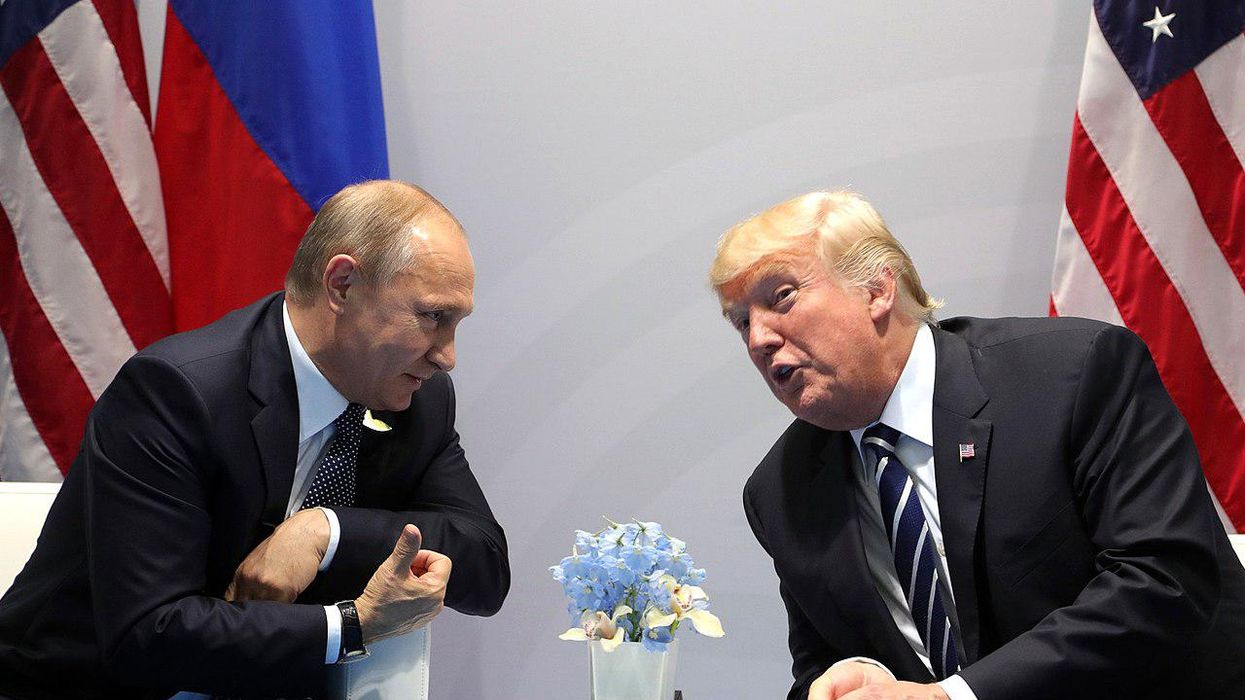'Increased vulnerability to subversion': Security expert explains how 'Putin blazed the trail that Trump' followed

Donald Trump and Russian President Vladimir Putin at the 2017 G-20 Summit, Wikimedia Commons
October 05, 2021 | 07:30AM ETBank
Dr. Fiona Hill was among the national security experts who testified during the hearings for former President Donald Trump's first impeachment. Hill looks back on Trump's presidency in article for the November/December issue of Foreign Affairs, discussing his relationship with Russian President Vladimir Putin and arguing that the U.S. has some of the daunting problems that plagued post-Soviet Russia during the 1990s.
"Indeed, over time, the United States and Russia have become subject to the same economic and social forces," Hill explains. "Their populations have proved equally susceptible to political manipulation. Prior to the 2016 U.S. election, Putin recognized that the United States was on a path similar to the one that Russia took in the 1990s, when economic dislocation and political upheaval after the collapse of the Soviet Union had left the Russian state weak and insolvent. In the United States, decades of fast-paced social and demographic changes and the Great Recession of 2008–9 had weakened the country and increased its vulnerability to subversion."
Hill continues, "Putin realized that despite the lofty rhetoric that flowed from Washington about democratic values and liberal norms, beneath the surface, the United States was beginning to resemble his own country: a place where self-dealing elites had hollowed out vital institutions and where alienated, frustrated people were increasingly open to populist and authoritarian appeals. The fire was already burning; all Putin had to do was pour on some gasoline."
Putin made no secret of the fact that he preferred Trump over Democratic nominee Hillary Clinton in the 2016 election, and he was disappointed when Trump lost to now-President Joe Biden four years later.
"When Trump was elected, Putin and the Kremlin made no attempt to conceal their glee," Hill recalls. "They had thought that Clinton would become president and that she would focus on criticizing Putin's style of governance and constraining Russia. They had steeled themselves and prepared for the worst. Instead, they got the best possible outcome from their perspective—a populist, nativistic president with no prior experience in foreign policy and a huge, fragile ego. Putin recognized Trump as a type and grasped his political predilections immediately: Trump, after all, fit a mold that Putin himself had helped forge as the first populist leader to take power in a major country in the 21st Century. Putin had blazed the trail that Trump would follow during his four years in office."
Hill notes that as president, Trump "aped Putin's willingness to abuse his executive power by going after his political adversaries" and "imported Putin's style of personalist rule, bypassing the professional civil servants in the federal government."
"The event that most clearly revealed the convergence of politics in the United States and Russia during Trump's term was his disorganized but deadly serious attempt to stage a self-coup and halt the peaceful transfer of executive power after he lost the 2020 election to Biden," Hill explains. "Russia, after all, has a long history of coups and succession crises, dating back to the tsarist era, including three during the past 30 years."